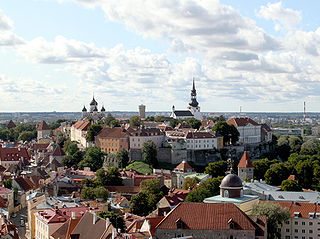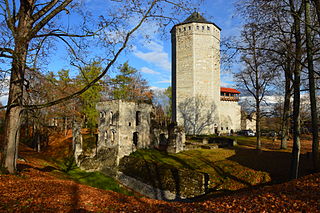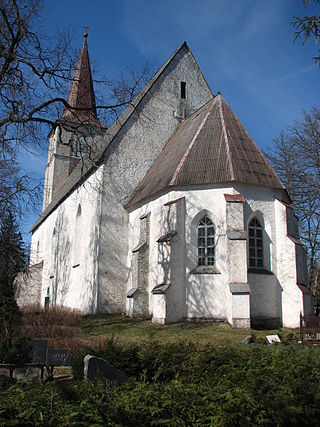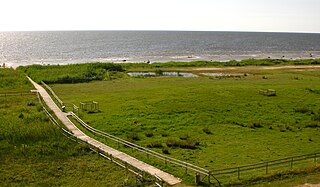
Tallinn is the capital and most populous city of Estonia. Situated on a bay in north Estonia, on the shore of the Gulf of Finland of the Baltic Sea, Tallinn has a population of about 461,000 and administratively lies in the Harju maakond (county). Tallinn is the main governmental, financial, industrial, and cultural centre of Estonia. It is located 187 km (116 mi) northwest of the country's second largest city, Tartu; however, only 80 km (50 mi) south of Helsinki, Finland, also 320 km (200 mi) west of Saint Petersburg, Russia, 300 km (190 mi) north of Riga, Latvia, and 380 km (240 mi) east of Stockholm, Sweden. From the 13th century until the first half of the 20th century, Tallinn was known in most of the world by variants of its other historical name Reval.

Tartu is the second largest city in Estonia after Tallinn. Tartu has a population of 97,435. It is 186 kilometres southeast of Tallinn and 245 kilometres northeast of Riga, Latvia. Tartu lies on the Emajõgi river, which connects the two largest lakes in Estonia, Lake Võrtsjärv and Lake Peipus. From the 13th century until the end of the 19th century, Tartu was known in most of the world by variants of its historical name Dorpat.

The national flag of Estonia is a tricolour featuring three equal horizontal bands of blue (top), black (middle), and white (bottom). The flag is called sinimustvalge in Estonian.

Pikk Hermann is a tower of the Toompea Castle, on Toompea (Domberg) hill in Tallinn (Reval), the capital of Estonia. The first part of the tower was built in 1360–1370. It was rebuilt in the 16th century. A staircase with 215 steps now leads to the top of the tower. It consists of ten internal floors and a viewing platform at the top.

Toompea is a limestone hill in the central part of the city of Tallinn, the capital of Estonia. The hill is an oblong tableland, which measures about 400 by 250 metres, has an area of 7 hectares and is about 20–30 metres higher than the surrounding areas. In folklore the hill is known as the tumulus mound over the grave of Kalev, erected in his memory by his grieving wife.

Rapla County is one of the fifteen counties of Estonia. It is situated in the western part of the country and borders Järva County to the east, Pärnu County to the south, Lääne County to the west, and Harju County to the north. In 2022 Rapla County had a population of 33,529 – constituting 2.5% of the total population of Estonia.

Lääne-Viru County is one of 15 counties of Estonia. It is in northern Estonia, on the south coast of the Gulf of Finland. In Estonian, lääne means western and ida means east or eastern. Lääne-Viru borders Ida-Viru County to the east, Jõgeva County to the south, and Järva and Harju counties to the west. In January 2013, Lääne-Viru County had a population of 58,806: 4.5% of the population in Estonia.

Jäneda is a small village in northern Estonia. It is located in Lääne-Viru County and is a part of Tapa municipality.

Paide is a town in Estonia and the capital of Järva County, one of the 15 counties of Estonia.

Kiiu is a small borough in Kuusalu Parish, Harju County, northern Estonia. It has a population of 859.

The Estonian Maritime Museum is located in the Fat Margaret tower in the old town of Tallinn. The museum presents the history of ships and navigation in Estonia and related to Estonia. Other parts of the Maritime Museum are the mine museum and the Seaplane Harbour museum where ships are presented. The museum claims to be one of the largest museums in Estonia and the most popular.

Kullamaa is a village in Lääne-Nigula Parish, Lääne County, in western Estonia.

Glehn Castle is a castle on the hillside of Nõmme, part of Tallinn, Estonia.

Taagepera Castle is a mansion in Taagepera village, Helme Parish, Valga County, Estonia. It was registered as a national cultural monument on 27 September 1999.

The Church of the Holy Ghost or Church of the Holy Spirit is a medieval Lutheran church in the old town district of Tallinn, Estonia. It is located behind Raekoja plats, and lies opposite the Great Guild and Maiasmokk, Tallinn's oldest café.

Endla Nature Reserve is a nature reserve situated in central Estonia.

Kabli Nature Reserve is a nature reserve situated in south-western Estonia, in Pärnu County.
Nordecon is Estonian construction company.


















